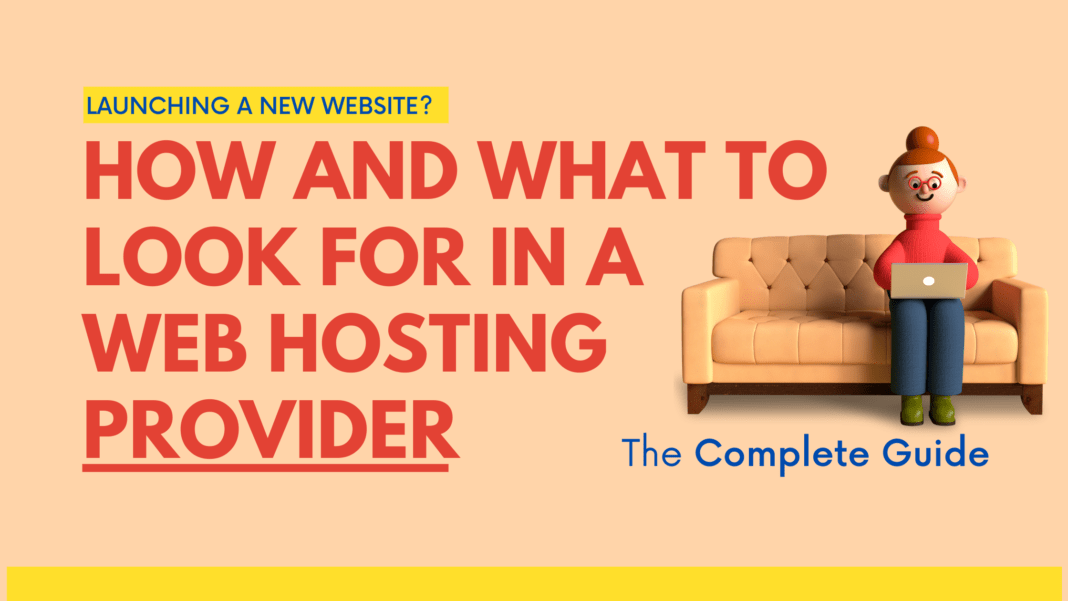Selecting a suitable Web Hosting Provider is far more complex and time-consuming than designing your website and promoting it once it’s online. However, you should take some time to consider your choices and ensure that you choose the right web hosting service for your needs.
But how are you supposed to know what to look for if this is your first website? Especially if you are unfamiliar with the definition of website hosting.
What is a Web Hosting Provider?
Before we can select a web host, we must first grasp the fundamentals of web hosting. Web hosting is the physical side of the internet. Any website you visit contains various photographs, media, applications, and other files that consume storage space. Although we think of the internet as existing outside time and space, storing of all the files is done on a physical server elsewhere.
Web hosts provide a large number of servers with the processing capacity to offer stable, dependable service to thousands of websites. You reserve some of the space on their servers when you sign up for a hosting contract. A good web host isn’t just selling space; they’re also selling their knowledge of how to keep their technology running smoothly, effectively, and securely—so that your website is always up and running.
For this purpose, a web hosting provider will give you three main things:
- The domain is the address of your website that people type into their browser to access it. For example, people can access our website using the domain name https://www.yourbranddomain.com/. Your hosting provider will allow you to choose a domain name for your website and notify you if it is already in use.
- The server is the computer that keeps the website up and running on the internet. It’s also in charge of sustaining that the website’s traffic. Your website will be ‘hosted’ on one of your hosting provider’s servers, enabling users to access it through the internet.
- Each website will have text, photos, videos, and other media files along with the code. Your host will provide you with dedicated space, where you can store all of the code and media files for your website.
All of which need the following
- Speed
- Reliability
- Scalability
- Security
So let’s take a closer look at each of these parameters.
What Should Expect From Your Web Hosting Provider?
1- Speed: How fast will your site load?
Your hosting’s speed and efficiency are determined by how fast your content loads in visitors’ browsers to your site, regardless of where they are. Storing all of your site’s files on a single server will have a negative impact on visitors’ experience. As loading speeds become slower and slower the farther away from your server they are.
The solution is to use a content delivery network to store and distribute your assets (CDN). A CDN distributes your files through multiple data centers across the world, then delivers them via the closest data center. This means quick page loads for all of your guests, no matter where they are in the world.
2- Scalability: Will my site crash the moment it goes viral?
Just after launching a hit marketing campaign, you might find your website in a situation where it is trending and has increased visitors, which will be above normal. So will your website be able to accommodate this influx with a high volume of visitors? This increased traffic can cause crashes, will your server crash if it receives too many requests? This is the primary concern in scalability: are you prepared if the website’s traffic grows?
The best services will automatically spin up servers as your traffic ebbs and flows, allowing you to handle any volume. This is why it’s essential to make sure your host is equipped with the technical know-how to deal with such situations.
3- Reliability: Will I have to deal with any downtime?
You might have come across the term uptime when looking for the right hosting package for your website. This is an essential aspect of Webhosting. The uptime of your website refers to how often your site is online and live. “I want it online all the time” is your default thought, and that’s a reasonable expectation.
The brutal truth is a website that fails to load regularly is useless to you. This will give the perception that the chances of successfully accessing your website are not guaranteed. And this can significantly damage your brand. This is why you should have a service that guarantees 99.99% reliability. Can your brand survive any downtime? If the answer is No, then do not skimp on hosting because cheap hosting is often unreliable. And ironically expensive to your brand in the long-run.
4- Security & HTTPS/SSL
Your host service provider is the bedrock of your website’s security. After all, this is where you’ll keep all of your website’s files. This is why a good hosting service provides multiple layers of protection to safeguard you and your clients.
To begin with, there is the physical datacentre, which should be safe from any breaches. Any requisite firewalls then protect the servers themselves. Finally, security mechanisms must be in place to secure your site from other sites using the same server, depending on the type of web hosting services you have.
With a growing number of online crimes involving fraudulent sites that harvest visitors’ private data, internet users are now wary of being scammed. Suppose you have noticed the difference between websites with URLs starting with HTTP:// and those that begin with HTTPS://. The S or the symbol of a lock in the latter means the website is secure, and an SSL certificate encrypts all communications between the user’s browser and the website. To avoid losing visitors due to no security protocols in place, use a host that can guarantee your visitor’s safety at all times.
Final words:
Besides helping you get your website live on the internet, your web hosting is essentially a business partner who has your best interests in mind. This relationship can make your brand break, so it is essential to choose the best fit for you. Whoever you settle on, make sure the type of hosting package you settle is tailor-made for your website needs. Once settled, you have the option always to switch packages or upgrade your hosting at a reasonable time.
I hope this tutorial helped you learn What to look for in your future Web Hosting Provider. For more hosting, step-by-step tutorials visit our dedicated hosting section and check our WordPress hosting providers guide if you are still looking for a host to start your company website or personal blog.






